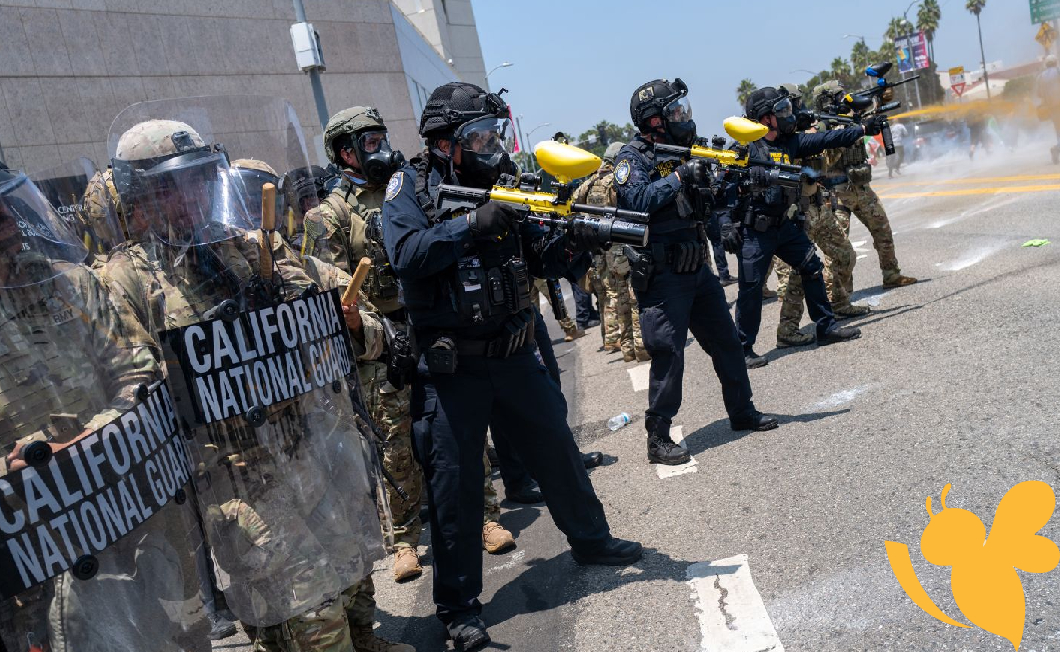The deployment of the National Guard to Los Angeles by President Trump has significantly heightened tensions between federal and state authorities during a period marked by intense protests. Following widespread demonstrations against Immigration and Customs Enforcement (ICE) actions, Trump ordered an additional 2,000 National Guard troops to the city, raising the total presence to approximately 3,700 . This military mobilization occurred without the consent of California Governor Gavin Newsom or Los Angeles Mayor Eric Garcetti, prompting accusations of overreach and provocation from Democratic leaders .
The deployment of the full Marine battalion marks a significant escalation in Trump’s use of the military as a show of force against protesters, but it is still unclear what their specific task will be once in LA, . Like the National Guard troops, they are prohibited from conducting law enforcement activity such as making arrests unless Trump invokes the Insurrection Act, which permits the president to use the military to end an insurrection or rebellion of federal power.
The Marines being activated are with 2nd battalion, 7th Marines, 1st Marine division, according to US Northern Command. The activation is “intended to provide Task Force 51 with adequate numbers of forces to provide continuous coverage of the area in support of the lead federal agency,” NORTHCOM said in statement, referring to US Army north’s contingency command post.
The troop deployment faces legal challenges and civil liberty concerns. California is suing the Trump administration, claiming the deployment is unconstitutional. Law enforcement's use of rubber bullets and flash bangs against protesters caused property damage and injuries, highlighting the strained federal-state relations during civil unrest.Critics argue that such deployments militarize responses to protests, potentially escalating tensions rather than de-escalating them. The Posse Comitatus Act generally prohibits the use of the military for domestic law enforcement, raising questions about the legality of the federal government's actions in this context. The situation underscores the delicate balance between maintaining order and protecting constitutional rights during periods of civil unrest, further complicated by the political divide between state and federal authorities.
The legal and ethical quandaries surrounding the deployment are amplified by the historical context of federal interventions in state affairs. The Trump administration's rationale for deploying troops often centered on quelling violence and restoring order, but critics argue that these actions served to suppress dissent and bolster a particular political narrative. The use of federal forces in cities like Portland and Kenosha sparked outrage and renewed debates about federal overreach and the erosion of local control. The long-term consequences of these deployments on community trust and the relationship between citizens and the government remain a significant concern, especially as the nation grapples with ongoing social and political divisions. The potential for future administrations to invoke similar powers necessitates a thorough examination of the legal boundaries and ethical implications of federal intervention in domestic affairs.
Read more
Parker Solar Probe Observes Intense Magnetic Eruption Aimed at Sun Watch match live Belgium vs Wales - prediction & lineupsSara H
Also on site :
- Eric Adams roasted online over bizarre ‘Netflix and chill’ blizzard comment as New York prepares for snow
- Richard Quinn signals the hourglass as key silhouette for autumn/winter 2026
- ‘Yeehaw couture:’ Why everyone wants to dress like a cowboy now

